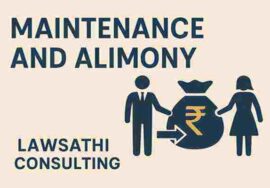What is Family Law?
🏛️ What is Family Law?
Family law in India deals with matters related to marriage, divorce, child custody, adoption, inheritance, guardianship, and maintenance. It governs personal relationships and family-related issues. Family law lawyer in Delhi.
📚 Sources of Family Law in India
Statutory Laws (e.g., Hindu Marriage Act, Muslim Personal Law, Special Marriage Act)
Personal Laws based on religion
Judicial Precedents
Customs and Usages
📖 Major Family Law Acts
- Hindu Law (for Hindus, Buddhists, Jains, Sikhs)
Hindu Marriage Act, 1955
The Hindu Succession Act, 1956
Hindu Minority and Guardianship Act, 1956
Hindu Adoption and Maintenance Act, 1956
- Muslim Law
Based on Shariat (personal law), with some codified laws like:
Muslim Women (Protection of Rights on Divorce) Act, 1986
- Christian Law
Indian Christian Marriage Act, 1872
Divorce Act, 1869
- Parsi Law
Parsi Marriage and Divorce Act, 1936 - Special Marriage Act, 1954
Civil marriage law applies to all religions, including interfaith marriages.
🔍 Key Areas Covered in Family Law
Marriage: Validity, registration, rights, and obligations.
Divorce: Mutual consent, cruelty, desertion, conversion, etc.
Maintenance: Financial support to spouse/children/parents.
Adoption: Legal process of adopting a child (governed mainly by Hindu law and the Juvenile Justice Act for others).
Guardianship: Custody and care of minors.
Succession & Inheritance: Distribution of property after death.
❓ FAQs
Q1: Can two people from different religions marry in India?
Yes, under the Special Marriage Act, 1954.
Q2: Is divorce allowed under all religions?
Yes, though the procedure and grounds may differ based on religion and applicable personal laws.
Q3: Who can adopt under Indian law?
Only Hindus, Buddhists, Jains, and Sikhs can adopt under the Hindu Adoption Act. Others must adopt under the Juvenile Justice Act, 2015. Family law lawyer in Delhi.
Disclaimer: This article is for educational and informational purposes only. It provides a general understanding of legal remedies but does not constitute legal advice. For specific legal guidance, you can consult a legal expert.







